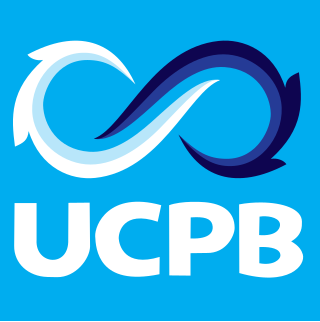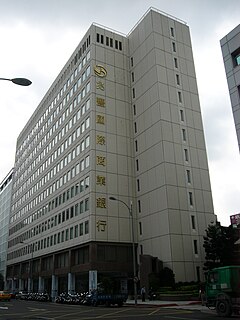
The Bangko Sentral ng Pilipinas is the central bank of the Philippines. It was established on July 3, 1993, pursuant to the provision of Republic Act 7653 or the New Central Bank Act of 1993 as amended by Republic Act 11211 or the New Central Bank Act of 2019.

Land Bank of the Philippines (LBP), often referred to as LandBank, is a universal bank in the Philippines owned by the Philippine government with a special focus on serving the needs of farmers and fishermen. While it provides the services of a universal bank, it is officially classified as a "specialized government bank" with a universal banking license.
BancNet is a Philippine-based interbank network connecting the ATM networks of local and offshore banks, and the largest interbank network in the Philippines in terms of the number of member banks and annual transactions. It is also designated by the Bangko Sentral ng Pilipinas(BSP) as the country's national ATM network.

BDO Unibank, Inc., commonly known as Banco de Oro (BDO), is a Philippine banking company based in Makati. In terms of total assets, the firm is the largest bank in the Philippines and 15th largest in Southeast Asia as of March 31, 2016. BDO Unibank is also a member of SM Group. It is also the largest bank in the country by market capitalization.
MegaLink is a Philippine-based developer of mobile and banking software as well as a service provider for banks, specifically for automatic teller machine networks and point of sale systems of banks in the country. From its establishment in 1989 until 2015, it pioneered the interconnectivity of several banks in the country by way of being the first interbank network with different banks as its members.
The Philippine National Bank is one of the largest banks in the Philippines. It was established by the Philippine government on July 22, 1916, during the American Era.

The United Coconut Planters Bank, more popularly known by its initials, UCPB, or by its old name, Cocobank, is a government-controlled and one of the largest banks in the Philippines, ranking within the top twenty banks in the country in terms of assets. It is the only existing universal bank not listed on the Philippine Stock Exchange. The bank, owing to its name, caters heavily to coconut farmers, but also serves a wide-ranging clientele.
China Banking Corporation, commonly known as China Bank, is a Filipino bank established in 1920. It was the first privately owned local commercial bank in the Philippines initially catering to the banking needs of Chinese Filipino businesspeople. It offers various banking services and products related to deposit, investment, trust, cash management, remittance, and financing products and services. It also offers insurance brokerage and bancassurance services through its subsidiary and affiliates.
The Rizal Commercial Banking Corporation (RCBC) was established in 1960 as a development bank and is licensed by the Bangko Sentral ng Pilipinas (BSP) for both commercial and investment banking. It is one of the largest universal banks in the Philippines with total consolidated resources of Php 772.11 billion
Nationlink is an interbank network and EFTPOS network in the Philippines. Unlike the main existing interbank networks, which are BancNet, ENS, Expressnet and MegaLink, Nationlink is not expected to compete with those networks. Instead, it seeks to complement those networks by extending the reach of ATMs in the countryside, as the main networks are largely concentrated in urban areas. Its closest competitor is the Encash Network Service.

International Exchange Bank, more commonly known as iBank, was one of the largest banks in the Philippines, ranking within the top twenty in terms of assets. It was recently acquired by the larger Union Bank of the Philippines in mid-2006, although the two banks remained separate. Integration of the iBank brand into the UnionBank brand was completed in mid-2008.
Maidavolu Narasimham was an Indian banker who served as the thirteenth governor of the Reserve Bank of India (RBI) from 2 May 1977 to 30 November 1977. For his contributions to the banking and financial sector in India, he is often referred to as the father of banking reforms in India. Some of the reforms attributed to his recommendations include changes to banking structures, introduction of private sector banks, creation of asset recovery funds, rural banking, changes to capital adequacy and provisioning standards, technology upgradation and modernization of public sector banks, and capital market linked banking reforms.
JG Summit Holdings, Inc (JGSHI) is one of the largest conglomerates in the Philippines with business interests in air transportation, banking, food manufacturing, hotels, petrochemicals, power generation, publishing, real estate and property development, and telecommunications. Key subsidiaries include Universal Robina and Cebu Pacific. Incorporated on November 1990, JG Summit Holdings was founded by John Gokongwei Jr., one of the wealthiest individuals in Southeast Asia. In 2010, JGSHI was one of the ten most profitable companies on the Philippine Stock Exchange.

Queen City Development Bank, also known as Queenbank, is a Philippines private development bank based in Iloilo City. Founded in 1981, it has branches operating in key cities all over the country, offering financial services to both companies and individual investors. Its services include deposit in investment banking, corporate and retail financing, dollar deposits and other basic banking products.

BDO Network Bank is the largest rural bank in the Philippines based in Davao City. Established in 2004 through the consolidation of Network Rural Bank of Davao del Sur, the Rural Bank of Panabo of Davao del Norte and the Provident Rural Bank of Cotabato, ONB is the largest rural bank in the Philippines in terms of assets, with a network of 96 branches in Mindanao, 1 branch in Makati and province of Iloilo and a fleet of 135 ATMs throughout the provinces of Mindanao, including seventeen localities where it is the sole provider of financial services.

The Mega International Commercial Bank is a bank in Taiwan and a subsidiary of Mega Financial Holding Company. It has 105 branches in Taiwan, in additional to 17 branches, two representative offices and two wholly owned subsidiaries abroad. The bank's total workforce is over 5,100 and its aggregate paid-in capital is approximately NT$64.1 billion.
Financial inclusion is defined as the availability and equality of opportunities to access financial services. It refers to a process by which individuals and businesses can access appropriate, affordable, and timely financial products and services. These include banking, loan, equity, and insurance products. Financial inclusion efforts typically target those who are unbanked and underbanked, and directs sustainable financial services to them. Financial inclusion is understood to go beyond merely opening a bank account. It is possible for banked individuals to be excluded from financial services. Having more inclusive financial systems has been linked to stronger and more sustainable economic growth and development and thus achieving financial inclusion has become a priority for many countries across the globe.







